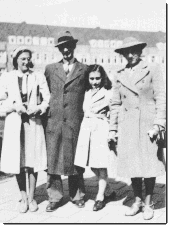|
|

The Life of Anne Frank
|
Share This Page
|
|
|
|
|
|
|
Follow This Site

|
 |
|
|
Part 3: A Sad End
Anne and her sister Margot were sent to another concentration camp, Bergen-Belsen, after a month at Auschwitz. At Bergen-Belsen, the conditions were very bad as well. People were dying of hunger and sickness by the thousands. Both Frank sisters got typhus, a very bad disease, and died, in March 1945. Just a few weeks later, Germany surrendered and the war was over.
 Of all the people who hid in the Secret Annex and were arrested and deported, only Otto Frank, Anne's father, survived. He was sent to Auschwitz and managed to survive until the concentration camp was liberated by the Russian Army. He went to Odessa, in the Soviet Union, and then to France before making his way back to Amsterdam to try to find the rest of his family. He knew that his wife was dead, but he hoped to find his children again, now that the war was over. He was reunited with Miep Gies in Amsterdam. In October of 1945, Frank received a letter telling him that his daughters had died at the Bergen-Belsen camp. Gies then gave him Anne's diary, which Gies had been saving in order to return to the young girl when she came back. Of all the people who hid in the Secret Annex and were arrested and deported, only Otto Frank, Anne's father, survived. He was sent to Auschwitz and managed to survive until the concentration camp was liberated by the Russian Army. He went to Odessa, in the Soviet Union, and then to France before making his way back to Amsterdam to try to find the rest of his family. He knew that his wife was dead, but he hoped to find his children again, now that the war was over. He was reunited with Miep Gies in Amsterdam. In October of 1945, Frank received a letter telling him that his daughters had died at the Bergen-Belsen camp. Gies then gave him Anne's diary, which Gies had been saving in order to return to the young girl when she came back.
 Anne Frank died, a victim of German occupation. Her words and deeds and special way of looking at life and the world around her live on in her diary. Anne Frank died, a victim of German occupation. Her words and deeds and special way of looking at life and the world around her live on in her diary.
The diary was first published in 1947. One of the most widely read books in the world, the diary has been translated into 67 languages. Here are a few excerpts:
- "Our many Jewish friends and acquaintances are being taken away in droves. The Gestapo is treating them very roughly and transporting them in cattle cars to Westerbork, the big camp in Drenthe to which they're sending all the Jews....If it's that bad in Holland, what must it be like in those faraway and uncivilized places where the Germans are sending them? We assume that most of them are being murdered. The English radio says they're being gassed."
- "I've reached the point where I hardly care whether I live or die. The world will keep on turning without me, and I can't do anything to change events anyway. I'll just let matters take their course and concentrate on studying and hope that everything will be all right in the end."
- "When I write, I can shake off all my cares."
- "It’s a wonder I haven’t abandoned all my ideals, they seem so absurd and impractical. Yet I cling to them because I still believe, in spite of everything, that people are truly good at heart."
First page > The Early Years > Page 1, 2, 3
|
|



 Of all the people who hid in the Secret Annex and were arrested and deported, only Otto Frank, Anne's father, survived. He was sent to Auschwitz and managed to survive until the concentration camp was liberated by the Russian Army. He went to Odessa, in the Soviet Union, and then to France before making his way back to Amsterdam to try to find the rest of his family. He knew that his wife was dead, but he hoped to find his children again, now that the war was over. He was reunited with Miep Gies in Amsterdam. In October of 1945, Frank received a letter telling him that his daughters had died at the Bergen-Belsen camp. Gies then gave him Anne's diary, which Gies had been saving in order to return to the young girl when she came back.
Of all the people who hid in the Secret Annex and were arrested and deported, only Otto Frank, Anne's father, survived. He was sent to Auschwitz and managed to survive until the concentration camp was liberated by the Russian Army. He went to Odessa, in the Soviet Union, and then to France before making his way back to Amsterdam to try to find the rest of his family. He knew that his wife was dead, but he hoped to find his children again, now that the war was over. He was reunited with Miep Gies in Amsterdam. In October of 1945, Frank received a letter telling him that his daughters had died at the Bergen-Belsen camp. Gies then gave him Anne's diary, which Gies had been saving in order to return to the young girl when she came back. Anne Frank died, a victim of German occupation. Her words and deeds and special way of looking at life and the world around her live on in her diary.
Anne Frank died, a victim of German occupation. Her words and deeds and special way of looking at life and the world around her live on in her diary.
